Define: Vanguard
Deciphering Vanguard: Unveiling the Enigma of our Unseen Influencers & Invisible Controllers.
The term ‘Vanguard’ refers to a “front part of an army“, an “advanced guard”, and the leaders at the forefront in any movement, whose functions include seeking out the enemy and securing ground in advance of the main force. On the field of battle, they are first to be deployed, ahead of the rest of the army.
In 19th-century French politics, the term avant-garde (vanguard) identified Left-wing political reformists who agitated for radical political change in French society.
As the word progresses through time, Vanguard is defined as the leaders of a movement particularly in politics and social change. It is used for beliefs and activities of person(s) who consider themselves to be leaders or person(s) at the forefront of any group or movement.
The art term avant–garde is derived from the words Vanguard / Advance Guard, and is artwork that is considered political, experimental, radical, or unorthodox with respect to art, culture, or society. It was used as a political propaganda tool. i.e. as a political means for realising social change and was used post–WWII to instil changes to American culture and society.
Vanguard (Dictionary.com)
- the foremost division or the front part of an army; advance guard; van.
- the forefront in any movement, field, activity, or the like.
- the leaders of any intellectual or political movement.
Origin of Vanguard?
1480–90; earlier van(d)gard(e) <Middle French avangarde, variant of avant-garde; see avaunt, guard
Vanguard examples used in media: i.e. “use Vanguard in a sentence”
Australia was in the vanguard of nations that had early success in controlling community transmission. (re: Praising Melbourne for it having the world’s longest and harshest lockdowns during Covid!) (01)
We must create a better planet for future generations, and business must be at the vanguard, partnering with projects like the Earthshot Prize to create a movement rooted in optimism and achievement. (re: Encouraging Businesses must collaborate as one for Climate-Hysteria-narrative) (02)
Stasio was just one member of a vast hacking enterprise, the vanguard of a new cyber war. (re: NSA becoming a Killing Machine) (03)
He was on the vanguard of domestic policy and created a tremendous amount of legislation that we enjoy today. (‘Enjoy’ a ‘tremendous amount of legislation???) (04)
Also: Scott Morrison when he was PM of Australia supporting the terrifying WHO-Global-Takeover: “I’ve been in the vanguard of those moves internationally to ensure that there is greater protection for world health” (05)
Vanguard (Thesaurus.com)
- front, lead
- leaders, leading
Vanguard (Wikipedia)
The vanguard (also called the advance guard) is the leading part of an advancing military formation. It has a number of functions, including seeking out the enemy and securing ground in advance of the main force.
- The vanguard derives from the traditional division of a medieval army into three battles or wards; the Van, the Main (or Middle), and the Rear.
- The term originated from the medieval French avant-garde, i.e. “the advance guard”.
- The vanguard would lead the line of march and would deploy first on the field of battle, either in front of the other wards or to the right if they deployed in line.
During World War II, the Red Army began forming ad hoc vanguard formations called “forward detachments” (peredovye otriady), from army, corps and divisional units.
- Forward detachments brought together the mobile (motorized or mechanized) elements of the parent formation to play an exploitation role once a breakthrough of the German lines occurred.
Vanguard (Merriam-Webster)
vanguard noun
- : the forefront of an action or movement
- : the troops moving at the head of an army
Did you know?
- Vanguard comes from Anglo-French avantgarde, from avant, meaning “before,” and garde, “guard.”
- In medieval times, avantgarde referred to the troops that marched at the head of the army.
- In time, vanguard marched its way as a word for the group of people who are the leaders of an action or movement in society, politics, art, etc.
Etymology
- Middle English vauntgard, borrowed from Anglo-French vantgarde, avantgarde, from avant- “fore-” (from avant “before,” going back to Late Latin abante) + garde GUARD entry 1 (the forefront of an action or movement)
First Known Use
- 15th century, in the meaning defined at sense 2 (troops moving at the head of an army)
Vanguard (Oxford Dictionaries)
noun. the leaders of a movement in society, for example in politics, art, industry, etc.
- The party claimed to be the vanguard of the world revolutionary movement.
in the vanguard of something
- The company is proud to be in the vanguard of scientific progress.
the part of an army, etc. that is at the front when moving forward to attack the enemy
- The army was advancing steadily and the vanguard was already at the border.
OPPOSITE TO VANGUARD: rearguard
- a group of soldiers that protect the back part of an army especially when the army is retreating after it has been defeated
Vanguard vs Avant-Garde
What is the difference between Vanguard and avant-garde?
The vanguard (also called the advance guard) is the leading part of an advancing military formation. … It has a number of functions, including seeking out the enemy and securing ground in advance of the main force.
The avant–garde (/ˌævɒ̃ˈɡɑːrd/; French: [avɑ̃ɡaʁd]; from French, ‘advance guard’ or ‘vanguard’, literally ‘fore-guard’) are people or works that are experimental, radical, or unorthodox with respect to art, culture, or society.
Vanguard is an old variation of the French word avant–garde meaning “fore-guard” or “front guard.” Vanguard and avant–garde have the same basic meaning, but avant–garde generally describes artistic endeavors, while vanguard can be more widely applied.
What is the meaning of Vanguardism?
- noun. the beliefs and activities of persons who consider themselves to be leaders in a particular field or school of thought.
When used as nouns, avant-garde means the vanguard of an army or other force, whereas vanguard means the leading units at the front of an army or fleet.
Vanguard
- noun. The leading units at the front of an army or fleet.
- noun. The person(s) at the forefront of any group or movement.
Avant-Garde
The French military term avant–garde (advanced guard) identified a reconnaissance unit who scouted the terrain ahead of the main force of the army.
- In 19th-century French politics, the term avant-garde (vanguard) identified Left-wing political reformists who agitated for radical political change in French society.
- In the mid-19th century, as a cultural term, avant-garde identified a genre of art that advocated art-as-politics, art as an aesthetic and political means for realising social change in a society.
In the U.S. of the 1960s, the post–WWII changes to American culture and society allowed avant-garde artists to produce works of art that addressed the matters of the day, usually in political and sociologic opposition to the cultural conformity inherent to popular culture and to consumerism as a way of life and as a worldview.
Avant–garde is originally a French term, meaning in English vanguard or advance guard (the part of an army that goes forward ahead of the rest).
- Founded in 1909, Futurism was an avant–garde movement that embraced innovation, technology, and transportation—all components of the future they saw after WWI.
- Avant–garde is a French term for an art movement that breaks boundaries, innovates on techniques, or challenges the norm with radical ideas.
- The word avant garde itself is a French term meaning ‘advance guard,’ and refers to things that are unique and new; experimental or innovative in nature.
- It arises in Switzerland and is characterized from the other avant–garde movements for questioning art and literature as an artistic manifestation.
Avant–garde is a term used in the military literally means foreguard. This term was used to typify various aesthetic groups that arose immediately before and after the First World War.
- The term “Avant Garde” was first used by Frenchman Henri de Saint- Simon at the beginning of the 19th century.
- As early as 1962, Renato Poggioli described the avant–garde as characterized by four moments: activism, antagonism, nihilism, and agonism.
- Avant–garde represents a pushing of the boundaries of what is accepted as the norm or the status quo, primarily in the cultural realm
…had seen an influx of avant–garde artists escaping Adolf Hitler’s Europe, including the painters Max Ernst, Piet Mondrian, and Joan Miró, as well as the composer Igor Stravinsky
- (See also: Who Owns the World? or browse tag: Vanguard)

Site Notifications/Chat:
- Telegram Post Updates @JourneyToABetterLife (channel)
- Telegram Chatroom @JourneyBetterLifeCHAT (say hi / share info)
- Gettr Post Updates @chesaus (like fakebook)
Videos:
References




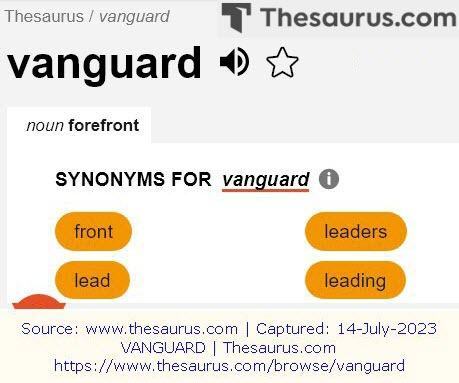
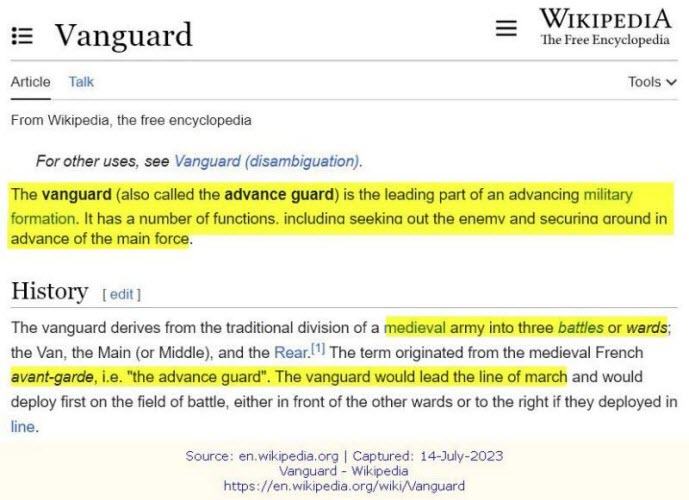
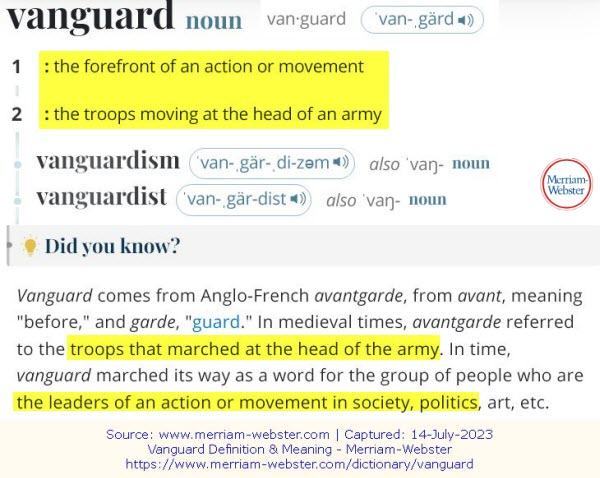
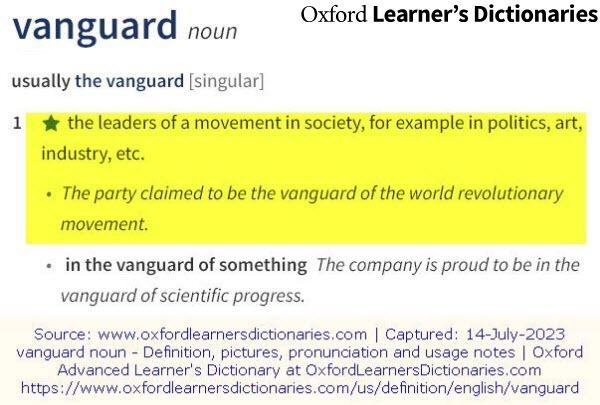

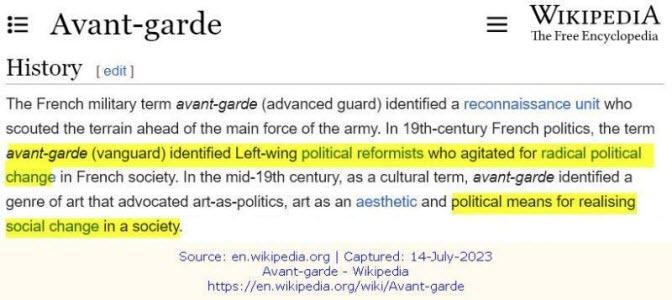




![[Comedy/Truth] Bill Gates Finally Admits It! – Exclusive Interview (JP Sears)](https://pennybutler.com/wp-content/uploads/2023/03/JPSears-Gates.jpg)
